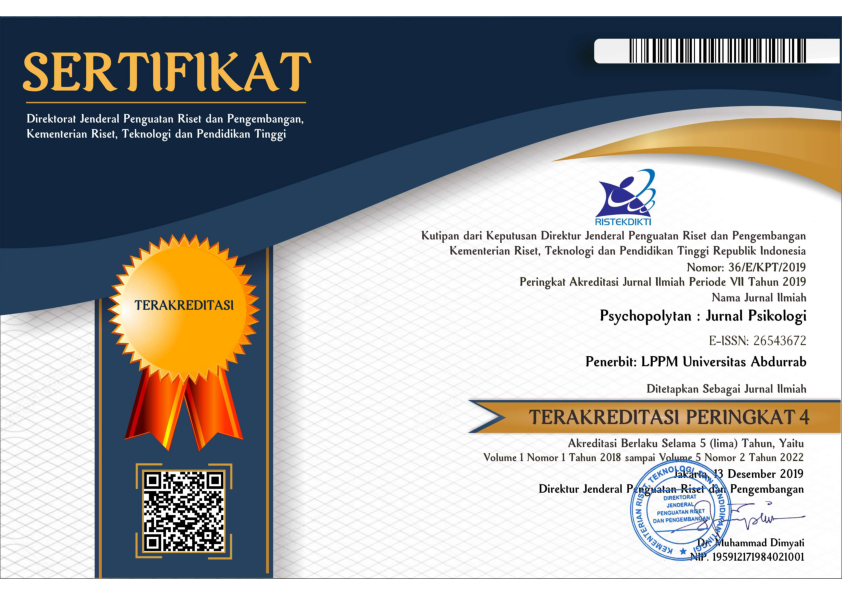Peran Dukungan Sosial dan Implementasi RAB Value terhadap Work Engagement pada Civitas Akademika di Universitas Abdurrab
(Submitted 3 Juni 2020) (Published 3 Agustus 2020)
Abstract
Penelitian ini dilakukan bertujuan untuk mengetahui bagaimana peran dukungan sosial dan implementasi RAB Value terhadap work engagement pada Civitas Akademika yang bekerja di Universitas Abdurrab. Work engagement merupakan situasi dan kondisi ketika individu melibatkan diri secara penuh dalam pekerjaannya. Diantara hal yang bisa meningkatkan work engagement adalah dukungan sosial yang diperoleh individu dari lingkungan sosialnya. Kemudian faktor penting yang harus diamalkan oleh Civitas Akademika Universitas Abdurrab adalah RAB Value yang merupakan ciri khas dan merupakan nilai luhur yang harus ditanamkan di dalam diri. Sebanyak 68 orang partisipan yang terdiri dari 52 orang dosen dan 16 orang tenaga kependidikan terlibat dalam penelitian ini. Penentuan sampel menggunakan purposive sampling yaitu dengan ciri-ciri merupakan karyawan tetap di Universitas Abdurrab. Pengambilan data dilakukan dengan menggunakan skala work engagement, dukungan sosial, dan implementasi RAB Value. Analisis dalam penelitian ini menggunakan regresi linear berganda. Hasil penelitian ini menunjukkan bahwa peran yang diberikan dukungan sosial dan implementasi RAB Value menunjukkan nilai signifikansi sebesar 0,000 (p<0,005). Hal tersebut menunjukkan bahwa dukungan sosial dan implementasi RAB Value berperan terhadap work engagement yang dimiliki civitas akademika Universitas Abdurrab.
References
Albrecht, S.L. (2010). Handbook of employee engagement: Perspective, issues, practice & research (eds). UK: Edward Elgar Publishing Limited.
Armstrong, G.S., Atkin-Plunk, C.A. and Wells, J. (2015). The relationship between work–family conflict, correctional officer job stress, and job satisfaction. Criminal Justice and Behavior, 42 (10).
Awuni, M., & Tanko, M.Z. (2019). Organizational Citizenship Behavior and Religiosity at the Workplace. International Journal of Contemporary Research and Review, 10 (05).
Bakker, A.B. & Demerouti, E. (2008). Towards a model of work engagement. Career development international, 3.
Bakker, A.B., Schaufeli, W.B., Leiter, M.P., & Taris, T.W. (2008). Work engagement: an emerging concept in occupational health psychology. Work & stress: an international journal of work, health & organisations, 3.
Bakker, A.B., Albrecht, S.L., & Leiter, M,P. (2011). Key questions regarding work engagement. European journal of work and organizatonal psychology, 20 (1).
Bakker, A.B., & Albrecht, S. (2018). Work engagement: current trends. Career Development International, 23 (1).
Beckett, C., Maynard, A., & Jordan, P. (2017). Values and ethics in social work. UK: Sage.
Çankır, B., Arıkan, S. (2019). Examining work engagement and job satisfaction variables in their relations with job performance and intention to quit. İşletme Araştırmaları Dergisi, 11 (2).
Costa, P.L., Passos, A. and Bakker, A.B. (2015). Direct and contextual influence of team conflict on team resources, team work engagement, and team performance. Negotiation and Conflict Management Research, 8 (4).
Engelbrecht, A. S., Heine, G., & Mahembe, B. (2017). Integrity, ethical leadership, trust and work engagement. Leadership & Organization Development Journal, 38 (3).
Falconier, M.K., Nussbeck, F., Bodenmann, G., Schneider, H. and Bradbury, T. (2015). Stress from dailyhassles in couples: its effects on intradyadic stress, relationship satisfaction, and physical and psychological well-being. Journal of Marital and Family Therapy, 41 (2).
Fernandes, C., & Tewari, K. (2012). Organizational role stress: impact of manager and peer support. Journal of Knowledge Globalization, 5 (1).
Field, L.K., & Buitendach, J.H. (2011). Happiness, work engagement, and organisational commitment of support staff at a tertiary education institution in south africa. South African Journal of Industrial Psychology, 37.
Glock, C. & Stark, R. (1966). Religion and society in tension. Chicago: University of California.
Gorgievski, M.J., Bakker, A.B., & Schaufeli, W.B. (2010). Work engagement and workaholism: Comparing the self-employed and salaried employees. Journal of Positive Psychology, 5
Hariyani, Y. (2019). Urgensi islamisasi sains dalam menghadapi mordenisasi; pendekatan teologis. Al Hikmah: Jurnal Studi Keislaman, 9 (1).
Harter, J.K., Schmidt, F. L., & Hayes, T. L. (2002). Business-unit level relationship between employee satisfaction, employee engagement, and business outcomes: a meta-analysis. Journal of applied psychology, 87.
Hidayatullah, F.S. (2013). Manajemen pendidikan agama islam di perguruan tinggi umum (studi kasus di institut pertanian bogor). Jurnal Pendidikan Islam, 28 (2).
Kiema‐Junes, H., Saarinen, A., Muukkonen, H., Väyrynen, S., Ala‐Mursula, L., & Hintsanen, M. (2020). Dimensions of social support in the experience of work engagement in middle age: A Northern Finland Birth Cohort 1966 Study. Scandinavian Journal of Psychology.
Liu, Y., & Aungsuroch, Y. (2019). Work stress, perceived social support, self‐efficacy and burnout among Chinese registered nurses. Journal of nursing management, 27 (7).
Lockwood, N.R. (2007). Leveraging employee engagement for competitive advantage: hr's strategic role (SHRM research quarterly report). VA: Society for Human Resource Management.
Lu, L., Lu, A. C. C., Gursoy, D., & Neale, N. (2016). Work engagement, job satisfaction, and turnover intentions: a comparison between supervisors and line-level employees. International Journal of Contemporary Hospitality Management, 28 (5)
Malecki, C., & Demaray, K. M. (2003). Social support as a buffer. Illinois: Running Hedd.
Nasurdin, A.M., Ling, T.C., & Khan, S.N. (2018). Linking social support, work engagement and job performance in nursing. International Journal of Business & Society, 2.
Orgambídez-Ramos, A., & de Almeida, H. (2017). Work engagement, social support, and job satisfaction in Portuguese nursing staff: A winning combination. Applied Nursing Research, 36.
Parent, J. & Lovelace, K. (2018). Employee engagement, positiveorganizational culture and individual adaptability. On the Horizon, 26.
Petchsawang, P., & McLean, G. N. (2017). Workplace spirituality, mindfulness meditation, and work engagement. Journal of Management, Spirituality & Religion, 14 (3).
Pri, R., & Zamralita. (2017). Gambaran work engagement pada karyawan di pt eg (manufacturing industry). Jurnal Muara Ilmu Sosial, Humaniora, dan Seni, 1 (2).
Saks, A.M. (2006). Antecedents and Consequences of Employee Engagement. Journal of Managerial Psychology, 21 (7).
Sarafino, E. P. & Smith, T.W. (2011). Health psychology biopsychosocial interactions (ed. 7). USA: John Milley and Sons Inc.
Schaufeli, W., & Bakker, A. (2003). Utrecht Work Engagement Scale Preliminary Manual. Occupational Health Psychology Unit. Utrecht: Utrecht University,
Schaufeli, W.B. & Bakker, A.B. (2004). Job demands, job resources, and their relationship with burnout and engagement: A multi-sample study. Journal of organizational behavior, 25.
Septiani, N., & Nurtjahjanti, H. (2017). Hubungan antara dukungan sosial pasangan dengan keterikatan kerja pada aparat pemerintah desa di kecamatan x,y,z kabupaten batang. Jurnal Empati, 6 (4).
Shani, I.N., Bamberger, P.A., & Bacharah, S.B. (2011). Social support and employee well-being: The conditioning effect of perceived patterns of supportive exchange. Journal Sociological Behavior, 1.
Simosi, M. (2012). Disentangling organizational support construct: The role of different sources of support to newcomers' training transfer and organizational commitment. Personnel Review, 41 (3).
Subandi, M.A. (2013). Psikologi agama & kesehatan mental. Yogyakarta: Pustaka Pelajar.
Sundary, R.I. (2010). Internalisasi prinsip-prinsip islam tentang etika kerja dalam perlindungan hak pekerja dan pelaksanaan hak atas pekerjaan. Syiar Hukum, 12 (2).
Timms, C., & Brough, P. (2013). I like being a teacher: career satisfaction, the work environment and work engagement. Journal of Educational Administration, 51 (6).
van Mol, M.M., Nijkamp, M.D., Bakker, J., Schaufeli, W.B., & Kompanje, E.J. (2018). Counterbalancing work-related stress? Work engagement among intensive care professionals. Australian Critical Care, 31(4).
Yan, X., Su, J., Wen, Z., & Luo, Z. (2019). The role of work engagement on the relationship between personality and job satisfaction in chinese nurses. Current Psychology, 38 (3).
Yukl, G. (2013). Leadership in organizations. New Jersey: Pearson.
Zahrah, N., Norasyikin, S., Binti Abdul, S.H B., Rani, A., Akmal, B., & Mustafa, B. (2016). The relationship between Islamic religiosity, Islamic work ethics and job performance. The European Proceedings of Social & Behavioral Sciences,7.
Copyright (c) 2020 Psychopolytan : Jurnal Psikologi

This work is licensed under a Creative Commons Attribution-NonCommercial-ShareAlike 4.0 International License.
1. Copyright of all journal manuscripts is held by the Psychopolytan : Jurnal Psikologi
2. Formal legal provisions to access digital articles of electronic journal are subject to the provision of the Creative Commons Attribution-ShareAlike license (CC BY-NC-SA), which means that Psychopolytan : Jurnal Psikologi is rightful to keep, transfer media/format, manage in the form of databases, maintain, and publish articles.
3. Published manuscripts both printed and electronic are open access for educational, research, and library purposes. Additionally, the editorial board is not responsible for any violations of copyright law.
licensed under a Creative Commons Attribution-ShareAlike 4.0 International License.
 pdf
pdf
 Abstract views: 641
Abstract views: 641
 downloads: 560
downloads: 560

 :
:








